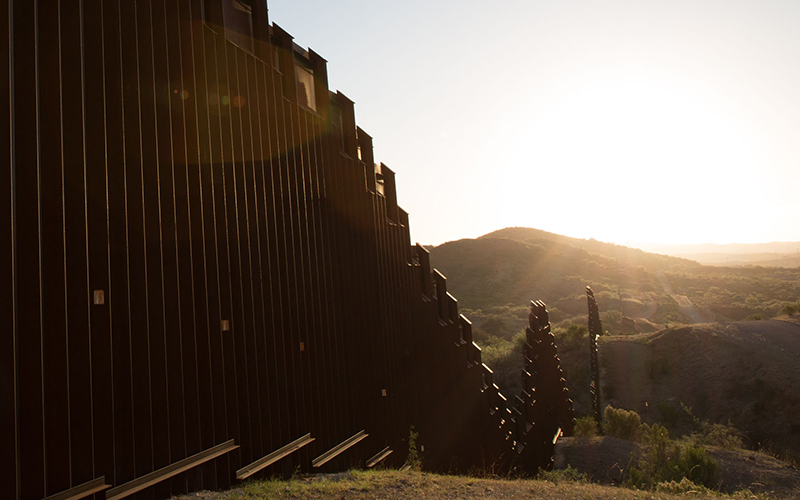- Slug: BC-CNS-Wall Tax,710
- File photo available (thumbnail, caption below)
By ARREN KIMBEL-SANNIT
Cronkite News
WASHINGTON – The White House is considering a 20 percent tax on imports as a way to pay for President Donald Trump’s proposed wall along the Mexican border, according to published reports Thursday.
Details on the plan were not available from the White House, which reportedly shifted positions several times over the course of the afternoon, but the broad outlines of an import tax were enough to earn the ire of businesses, lawmakers and some policy groups.
“(An import tariff) would be a disaster for the economy in general,” said Simon Lester, a trade policy analyst with the Cato Institute, a libertarian think tank. “Consumers are going to notice a price increase. Without the competition, everything produced in the U.S. would have a price increase. Then you get retaliation. That hurts U.S. exports.”
Reaction was just as sharp in Arizona, which does significant trade with Mexico.
“Tariffs are taxes on imports that are passed along to the American consumer,” said Garrick Taylor, vice president of government relations for the Arizona Chamber of Commerce.
He said an import tax of this magnitude, whether just on Mexico or on the world as a whole, could increase the cost of living for Americans and imperil the fragile Arizona border economy. Buying power for Mexican citizens, many of whom patronize U.S. businesses, would decrease.
The total value of imports to the U.S. in 2015 was $2.3 trillion, according to the World Bank, of which around $316 billion came from Mexico, the country’s third-largest supplier of imported goods.
Rep. Raul Grijalva, D-Tucson, said in a prepared statement that “cross-border commerce brings $737 million into our economy every month” in Arizona. His statement called the proposition of a tariff “reckless and short-sighted.”
“Not only has Trump confirmed that Mexico will not pay for the wall – every dime of this tariff will be shouldered by American consumers – but he has also just given our third-largest trading partner in the world good reason to retaliate against U.S. exports,” Grijalva said.
White House press secretary Sean Spicer acknowledged the tariff was being considered, telling reporters that the president discussed it with congressional lawmakers before speaking Thursday at a GOP retreat in Philadelphia.
In later published accounts, he was quoted as saying the import tax, which was initially reported as only applying to Mexico, is just one of many ways the White House is considering funding the wall. The statement was clarified later still to only apply to businesses selling imported goods in the United States.
Attempts to reach the White House for comment were not immediately returned Thursday.
A blanket tariff would impact Arizona’s economy on several levels and would violate the North American Free Trade Agreement, said Sapna Gupta, a senior policy analyst at the Morrison Institute.
“Mexico exports, and we bring in, a large amount of winter produce. The cost of tomatoes, for example, would go up,” she said.
Arizona’s mining and manufacturing industry would also be affected by potential retaliatory tariffs from Mexico, as much of those products are exported south of the border, she said. That could spark a potential international trade war and a game of “one-upmanship.”
The outcome will depend on details from the White House and GOP legislators on exactly whom would be taxed, and whether a tariff would apply to services as well as imported goods, she said.
The lack of details leaves several possibilities open. Lester of the Cato Institute noted that, while a blanket tax would be detrimental, it’s possible the White House may be pushing a different plan under the guise of a punitive tariff.
“The other possibility, which is way different, is the Republican tax reform plan, a Value-Added Tax,” he said. “It’s not a discriminatory tax on imports, it’s a tax on all products that applies to imports.
“Right now, all corporations are paying income tax. The change would be, you’re taxing based on where the product is sold,” he said.
So companies like Walmart, which deal in high volumes of imported goods, would pay higher taxes, while those like Google would pay less.
“I like the idea of a lower tax,” Lester said. “But it’s a different style of taxation. I’m not sure it’s necessarily better.”
^__=
Web links:
_ U.S.-Mexico trade: https://ustr.gov/countries-regions/americas/mexico
_ World Bank: http://wits.worldbank.org/CountrySnapshot/en/USA/textview
^__=
The fence between Nogales, Sonora, left, and Nogales, Arizona. President Donald Trump has promised to extend current fences the length of the border and make Mexico pay, but the White House is reportedly eyeing an import tax for the wall. (Photo by Cronkite News)
